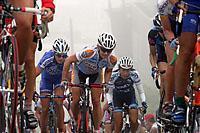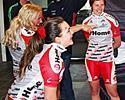Special News Feature, October 27, 2003
The Yoplait Women's Summit
Planning the future of women's cycling
By Giana Roberge, Team Sports

|
Women racers and their supporters gathered at Interbike on the evening of October 13 for the second Yoplait Women's Cycling Summit Conference. Their mission was to continue the work that they began at the first conference, which was held at the Nature Valley Grand Prix last June. These conferences are opening channels of communication so that people can share resources as they work together to build women's racing.
Grassroots Racing
One of the key goals of these conferences is to find ways to make entry-level racing more accessible to women. Women often find bicycle racing unattractive because they don't see themselves as competitors, but instead prefer to challenge themselves as individuals. However, women who do decide to participate in races are often very competitive and committed.
A number of grassroots programs that were represented at the conference reported great success in making entry-level racing accessible. Supportive clubs and women's rides and clinics offer a sense of community and opportunities for skills development that can take the intimidation out of the first race. Great examples included Cycling Made Real, MtbChick, Velo Girls, Luna Chix, and Single Track Sistahs.
Bike shops can also play an essential role in supporting women's cycling. Many women find bike shops to be scary place since they are male-dominated and use unfamiliar jargon. Shops can make themselves more woman-friendly by avoiding the use of jargon, listening to their women customers and supporting women's programs, rides and clinics. The payback to these shops will be a significant increase in income.
Although clinics can be a great way to get into racing, women often find that there is nothing available to facilitate the next step. This echoes comments made at the last conference by Saturn rider Jessica Phillips, who reported that she could find no coaching until she was on a pro team.
Elite Racing
Grassroots racing is the foundation of elite racing. It is the source of event organizers, volunteers, spectators, supporters and future elite riders. In exchange, elite racing provides sports heroes.
Much of the discussion at this conference revolved around national-level events. While some promoters do a great job of supporting women's racing, others seem to be more tentative. These promoters are often worried that they'll offer a large prize list and a high-profile time slot, then get a very small women's field. These promoters could get a much better turnout by reaching out more aggressively to women racers. It is also the responsibility of the women's teams to support those races that support their sport.

|
One of the challenges that face elite women's is the number of races on the National Racing Calendar, since most can only afford to attend a fraction of them. Participants at the first conference called for the creation of a focused series of no more than 18-20 events, and this sentiment was echoed at the Interbike conference.
Conference participants generally felt that USA Cycling should establish minimum prize lists for inclusion of events on the women's National Racing Calendar, something that is already done for the men's calendar. However, there was also considerable agreement that many teams would prefer smaller prize lists if it meant that the promoters would offer travel subsidies to the teams.
The conference also touched on public relations. Bike racing needs to pay a lot more attention to media relations. The sport is lacking women celebrities such as Missy Giove. Riders and teams are not as media savvy as in other sports and often fail to respond to requests from the media who want to cover the sport. Each team should provide a spokesperson whose job it is to work with the media.
Look for an announcement of the next Yoplait Women's Cycling Summit Conference soon.

